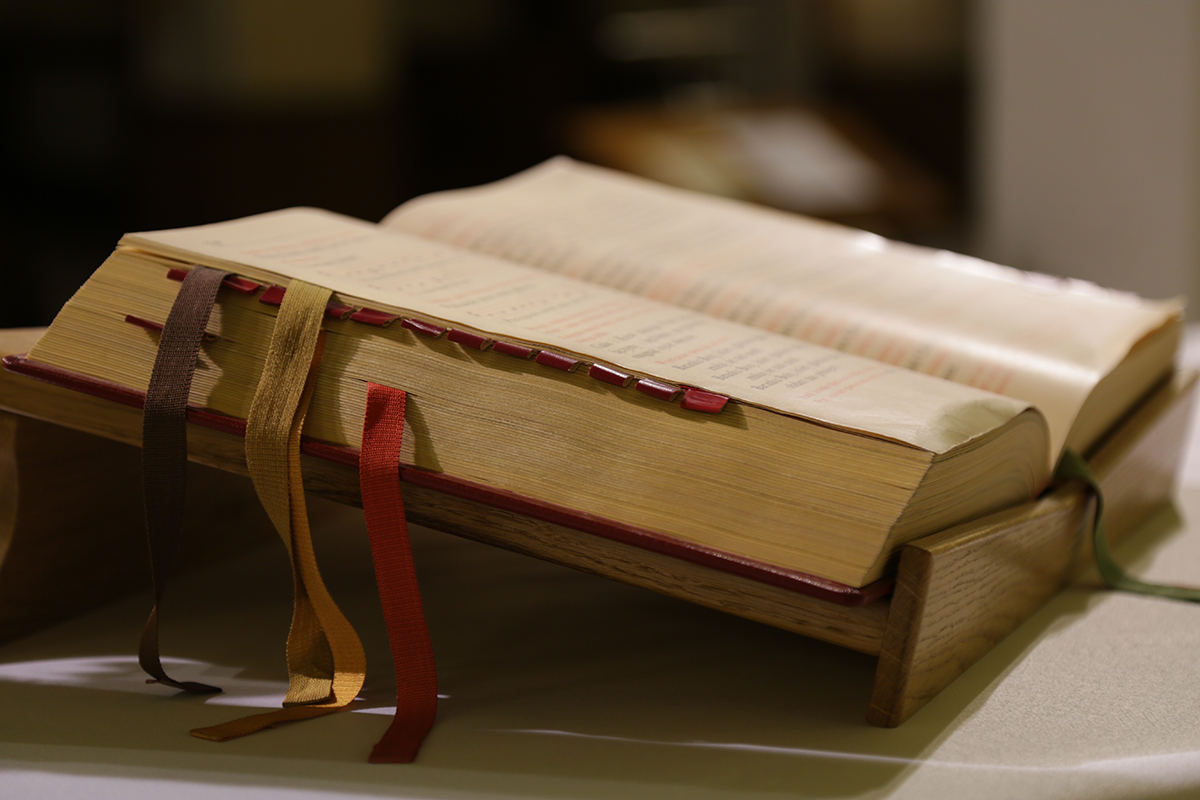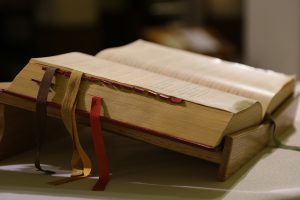
Liturgical book with colored tabs lying on a wooden stand on a white tablecloth
Question:
Can you help me understand why so much of the Mass is repetitive? So many of the prayers are the same from week to week, and it seems like if there was more variety, it’d be more interesting to both Catholics and others as well.
Answer:
Thank you for this honest question! It’s true there is a good deal of repetition in the Mass, and it’s common to wonder if less repetition would make it easier to keep our attention focused.
So in order to answer this question, I’d like first to explain a bit about the Mass prayers from a “big picture” perspective, and then we’ll focus on the question.

At every Mass, there are two sets of prayers: the prayers of the order (in Latin, “ordo”), and the “proper” prayers. The prayers of the proper are those prayers that are “proper” to that particular Sunday or Feast Day (these prayers change with the Liturgical Calendar). For instance, the opening prayer (formally called the “collect”) we pray changes from Sunday to Sunday and for the various saints whose feasts we celebrate.
On the other hand, the prayers of the order are those prayers that are the same from Sunday to Sunday or from weekday to weekday; at every Mass, they are the same. The Gloria is an example of this: whenever we pray the Gloria, the words are the same; they do not change because of the Sunday we are celebrating.
Both the “order prayers” and the “proper prayers,” however, are set and predetermined in the book of prayers for the Mass, the Roman Missal. This is where our question this month is relevant, in that it’s common for people—including Catholics—to ask about the heavy usage of set, formula prayers at Mass. Oftentimes people have in mind the adage that “familiarity breeds contempt,” or perhaps they are thinking of their own temptation to say the words mindlessly, without really thinking about them or praying them.
If that’s indeed the case, then why are the prayers of the Mass “set”?
I first want to note the importance of recognizing that merely saying words or saying them mindlessly isn’t the same as praying. This is definitely a temptation we need to be aware of. However, that doesn’t mean using set prayers will necessarily result in mindless worship at Mass.
Consider this everyday example of formulaic language: the most common way spouses express their love for one another is with the simple phrase “I love you.” I typically tell my wife “I love you” several times every day. Does the fact that I use the same phrase to express my love for her make my love any less real, my intention any less sincere? Of course not, even though it’s certainly possible I might say the phrase mindlessly on occasion.
The same is true with the Mass. There’s nothing inherently wrong with using the same words from week to week (or even day to day) when we’re praying to God at Mass, anymore than there is anything inherently wrong with using the same words to express my love and affection to those I care about day after day.
But it’s not just that we are able to avoid mindless repetition with the prayers at Mass. In fact, having the same words for Mass actually allows us to pray more fully. That is, the use of set prayers actually enables us to participate more fully and pray the Mass more easily.
Why? Because we already know what the priest is going to say, so we can enter more fully into the prayers he (and when appropriate, we) are saying. If the prayers of the Mass were all ad-libbed, it would be very difficult for us to enter into them, because we would need to listen to the words, understand them, and only then internalize them and make them our prayer. But because we already know the prayers being said, we can much more easily make them our own prayer.
And that’s what the Church desires for us. The Mass isn’t meant to be so much about us merely listening to the priest as he prays with our occasional “chiming in.” It’s meant to be a communal prayer which he leads and we participate in, even when he’s the only one speaking.
The Church wants us to be actively engaged in every part of the Mass, because it is meant to be our common prayer, even though we have different parts to pray, if you’ll excuse the pun. None of us are meant to be merely spectators at Mass…we are all called to be active participants in it.
Think of a football team, in which the quarterback has a different role to play than the running back, but they both are playing the same game. Or an orchestra, in which the percussion has a different part than the violins, but both are playing the same song.
By knowing the words that are coming next at the Mass, it’s easier for us to “pray it by heart” than if it were always different. And that’s what the Church desires for us.
Be sure to check out the additional resources at sfcatholic.org/answer. If you have a question you need an answer to, email rkranz@sfcatholic.org.
Chris Burgwald holds a doctorate in theology and is the director of discipleship formation for the Diocese of Sioux Falls.


